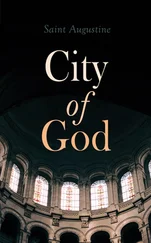Saint Augustine - The City of God, Volume II
Здесь есть возможность читать онлайн «Saint Augustine - The City of God, Volume II» — ознакомительный отрывок электронной книги совершенно бесплатно, а после прочтения отрывка купить полную версию. В некоторых случаях можно слушать аудио, скачать через торрент в формате fb2 и присутствует краткое содержание. Жанр: unrecognised, на английском языке. Описание произведения, (предисловие) а так же отзывы посетителей доступны на портале библиотеки ЛибКат.
- Название:The City of God, Volume II
- Автор:
- Жанр:
- Год:неизвестен
- ISBN:нет данных
- Рейтинг книги:4 / 5. Голосов: 1
-
Избранное:Добавить в избранное
- Отзывы:
-
Ваша оценка:
- 80
- 1
- 2
- 3
- 4
- 5
The City of God, Volume II: краткое содержание, описание и аннотация
Предлагаем к чтению аннотацию, описание, краткое содержание или предисловие (зависит от того, что написал сам автор книги «The City of God, Volume II»). Если вы не нашли необходимую информацию о книге — напишите в комментариях, мы постараемся отыскать её.
The City of God, Volume II — читать онлайн ознакомительный отрывок
Ниже представлен текст книги, разбитый по страницам. Система сохранения места последней прочитанной страницы, позволяет с удобством читать онлайн бесплатно книгу «The City of God, Volume II», без необходимости каждый раз заново искать на чём Вы остановились. Поставьте закладку, и сможете в любой момент перейти на страницу, на которой закончили чтение.
Интервал:
Закладка:
If these emotions and affections, arising as they do from the love of what is good and from a holy charity, are to be called vices, then let us allow these emotions which are truly vices to pass under the name of virtues. But since these affections, when they are exercised in a becoming way, follow the guidance of right reason, who will dare to say that they are diseases or vicious passions? Wherefore even the Lord Himself, when He condescended to lead a human life in the form of a slave, had no sin whatever, and yet exercised these emotions where He judged they should be exercised. For as there was in Him a true human body and a true human soul, so was there also a true human emotion. When, therefore, we read in the Gospel that the hard-heartedness of the Jews moved Him to sorrowful indignation, [71]that He said, "I am glad for your sakes, to the intent ye may believe," [72]that when about to raise Lazarus He even shed tears, [73]that He earnestly desired to eat the passover with His disciples, [74]that as His passion drew near His soul was sorrowful, [75]these emotions are certainly not falsely ascribed to Him. But as He became man when it pleased Him, so, in the grace of His definite purpose, when it pleased Him He experienced those emotions in His human soul.
But we must further make the admission, that even when these affections are well regulated, and according to God's will, they are peculiar to this life, not to that future life we look for, and that often we yield to them against our will. And thus sometimes we weep in spite of ourselves, being carried beyond ourselves, not indeed by culpable desire, but by praiseworthy charity. In us, therefore, these affections arise from human infirmity; but it was not so with the Lord Jesus, for even His infirmity was the consequence of His power. But so long as we wear the infirmity of this life, we are rather worse men than better if we have none of these emotions at all. For the apostle vituperated and abominated some who, as he said, were "without natural affection." [76]The sacred Psalmist also found fault with those of whom he said, "I looked for some to lament with me, and there was none." [77]For to be quite free from pain while we are in this place of misery is only purchased, as one of this world's literati perceived and remarked, [78]at the price of blunted sensibilities both of mind and body. And therefore that which the Greeks call ἀπάθεια, and what the Latins would call, if their language would allow them, "impassibilitas," if it be taken to mean an impassibility of spirit and not of body, or, in other words, a freedom from those emotions which are contrary to reason and disturb the mind, then it is obviously a good and most desirable quality, but it is not one which is attainable in this life. For the words of the apostle are the confession, not of the common herd, but of the eminently pious, just, and holy men: "If we say we have no sin, we deceive ourselves, and the truth is not in us." [79]When there shall be no sin in a man, then there shall be this ἀπάθεια. At present it is enough if we live without crime; and he who thinks he lives without sin puts aside not sin, but pardon. And if that is to be called apathy, where the mind is the subject of no emotion, then who would not consider this insensibility to be worse than all vices? It may, indeed, reasonably be maintained that the perfect blessedness we hope for shall be free from all sting of fear or sadness; but who that is not quite lost to truth would say that neither love nor joy shall be experienced there? But if by apathy a condition be meant in which no fear terrifies nor any pain annoys, we must in this life renounce such a state if we would live according to God's will, but may hope to enjoy it in that blessedness which is promised as our eternal condition.
For that fear of which the Apostle John says, "There is no fear in love; but perfect love casteth out fear, because fear hath torment. He that feareth is not made perfect in love," [80]—that fear is not of the same kind as the Apostle Paul felt lest the Corinthians should be seduced by the subtlety of the serpent; for love is susceptible of this fear, yea, love alone is capable of it. But the fear which is not in love is of that kind of which Paul himself says, "For ye have not received the spirit of bondage again to fear." [81]But as for that "clean fear which endureth for ever," [82]if it is to exist in the world to come (and how else can it be said to endure for ever?), it is not a fear deterring us from evil which may happen, but preserving us in the good which cannot be lost. For where the love of acquired good is unchangeable, there certainly the fear that avoids evil is, if I may say so, free from anxiety. For under the name of "clean fear" David signifies that will by which we shall necessarily shrink from sin, and guard against it, not with the anxiety of weakness, which fears that we may strongly sin, but with the tranquillity of perfect love. Or if no kind of fear at all shall exist in that most imperturbable security of perpetual and blissful delights, then the expression, "The fear of the Lord is clean, enduring for ever," must be taken in the same sense as that other, "The patience of the poor shall not perish for ever." [83]For patience, which is necessary only where ills are to be borne, shall not be eternal, but that which patience leads us to will be eternal. So perhaps this "clean fear" is said to endure for ever, because that to which fear leads shall endure.
And since this is so,—since we must live a good life in order to attain to a blessed life,—a good life has all these affections right, a bad life has them wrong. But in the blessed life eternal there will be love and joy, not only right, but also assured; but fear and grief there will be none. Whence it already appears in some sort what manner of persons the citizens of the city of God must be in this their pilgrimage, who live after the spirit, not after the flesh,—that is to say, according to God, not according to man,—and what manner of persons they shall be also in that immortality whither they are journeying. And the city or society of the wicked, who live not according to God, but according to man, and who accept the doctrines of men or devils in the worship of a false and contempt of the true divinity, is shaken with those wicked emotions as by diseases and disturbances. And if there be some of its citizens who seem to restrain and, as it were, temper those passions, they are so elated with ungodly pride, that their disease is as much greater as their pain is less. And if some, with a vanity monstrous in proportion to its rarity, have become enamoured of themselves because they can be stimulated and excited by no emotion, moved or bent by no affection, such persons rather lose all humanity than obtain true tranquillity. For a thing is not necessarily right because it is inflexible, nor healthy because it is insensible.
10. Whether it is to be believed that our first parents in Paradise, before they sinned, were free from all perturbation.
But it is a fair question, whether our first parent or first parents (for there was a marriage of two), before they sinned, experienced in their animal body such emotions as we shall not experience in the spiritual body when sin has been purged and finally abolished. For if they did, then how were they blessed in that boasted place of bliss, Paradise? For who that is affected by fear or grief can be called absolutely blessed? And what could those persons fear or suffer in such affluence of blessings, where neither death nor ill-health was feared, and where nothing was wanting which a good will could desire, and nothing present which could interrupt man's mental or bodily enjoyment? Their love to God was unclouded, and their mutual affection was that of faithful and sincere marriage; and from this love flowed a wonderful delight, because they always enjoyed what was loved. Their avoidance of sin was tranquil; and, so long as it was maintained, no other ill at all could invade them and bring sorrow. Or did they perhaps desire to touch and eat the forbidden fruit, yet feared to die; and thus both fear and desire already, even in that blissful place, preyed upon those first of mankind? Away with the thought that such could be the case where there was no sin! And, indeed, this is already sin, to desire those things which the law of God forbids, and to abstain from them through fear of punishment, not through love of righteousness. Away, I say, with the thought, that before there was any sin, there should already have been committed regarding that fruit the very sin which our Lord warns us against regarding a woman: "Whosoever looketh on a woman to lust after her, hath committed adultery with her already in his heart." [84]As happy, then, as were these our first parents, who were agitated by no mental perturbations, and annoyed by no bodily discomforts, so happy should the whole human race have been, had they not introduced that evil which they have transmitted to their posterity, and had none of their descendants committed iniquity worthy of damnation; but this original blessedness continuing until, in virtue of that benediction which said, "Increase and multiply," [85]the number of the predestined saints should have been completed, there would then have been bestowed that higher felicity which is enjoyed by the most blessed angels,—a blessedness in which there should have been a secure assurance that no one would sin, and no one die; and so should the saints have lived, after no taste of labour, pain, or death, as now they shall live in the resurrection, after they have endured all these things.
Читать дальшеИнтервал:
Закладка:
Похожие книги на «The City of God, Volume II»
Представляем Вашему вниманию похожие книги на «The City of God, Volume II» списком для выбора. Мы отобрали схожую по названию и смыслу литературу в надежде предоставить читателям больше вариантов отыскать новые, интересные, ещё непрочитанные произведения.
Обсуждение, отзывы о книге «The City of God, Volume II» и просто собственные мнения читателей. Оставьте ваши комментарии, напишите, что Вы думаете о произведении, его смысле или главных героях. Укажите что конкретно понравилось, а что нет, и почему Вы так считаете.












